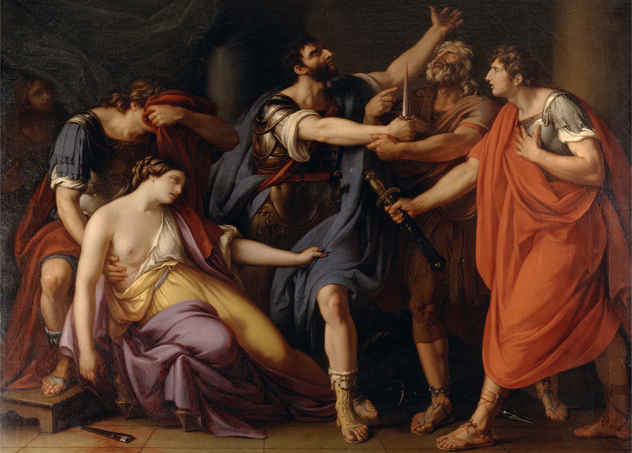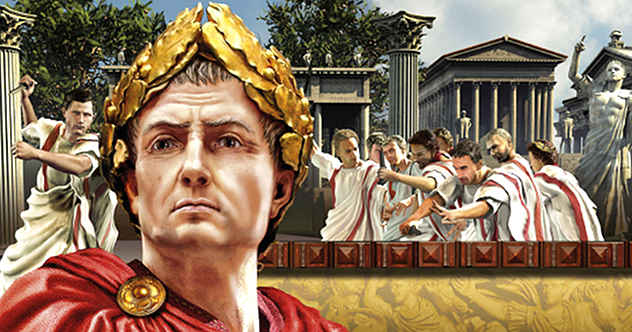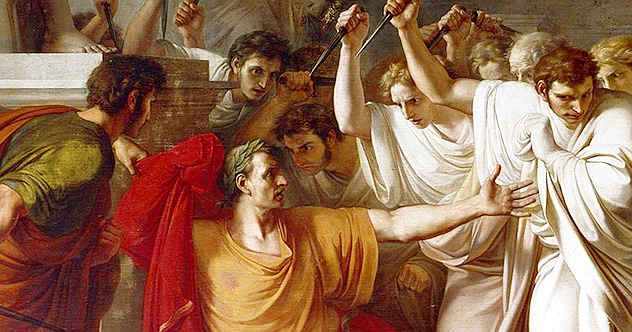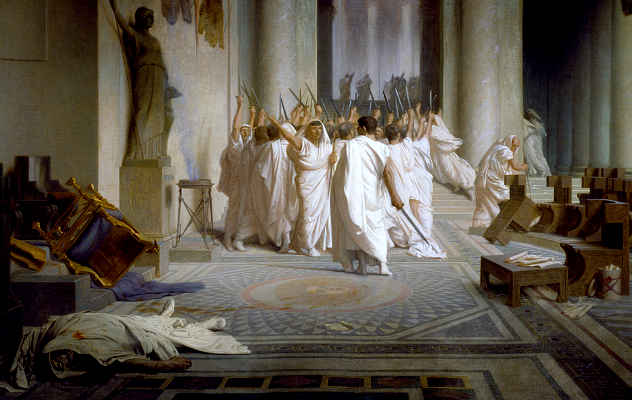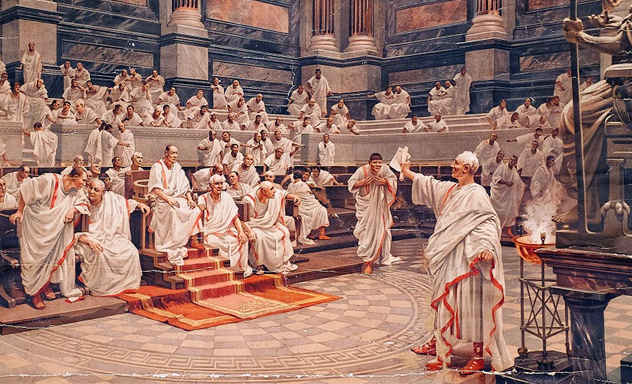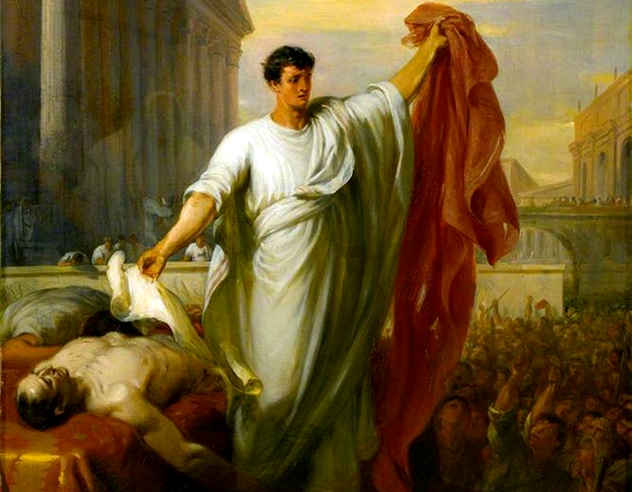Officially, they may have attacked Caesar to keep him from crowning himself king, but there were little moments in every one of their lives that set them on the path to murder. Most of those men have been forgotten, but each one had a life of his own. Each one of Caesar’s assassins has a story that ultimately led him to become a killer—and a story of the fallout that ensued.
10Caesar Was Sleeping with Brutus’s Mother
Caesar was not just Brutus’s friend—he was his mother’s lover. Before Brutus was even born, Caesar was sleeping with his mother, Servilia. Brutus almost certainly knew about it. Rumors about Caesar’s and Servilia’s relationship were all over Rome. Caesar, after all, did not do a great job at hiding it. He had a tendency to lavish her with gifts, at one point spending six million sesterces to buy her a single pearl. When Servilia got older, it just got worse. According to those Roman rumors, the aging Servilia made sure Caesar was not left with an empty bed. In her place, she sent her own daughter—Brutus’s sister—to Caesar’s bedroom.[1] This probably is not why Brutus killed Caesar—but it is the reason he lived long enough to do it. Brutus would have been killed for siding against Caesar in his war against Pompey, but Caesar ordered his men not to hurt him. Partly, he wanted to keep Brutus alive to keep Servilia happy—but there was more to it. Caesar had been sleeping with Servilia when she got pregnant. He was not entirely sure, but he thought there was a pretty good chance Brutus was his son.
9Cassius of Parma and Cicero Spread Rumors That Caesar Was Gay
Murder is not the only way to get back at somebody. The rumor mill in Rome was vicious. If you could not kill someone with a knife, you could always kill their reputation with a story. Cicero started the rumor that Caesar was gay—and, what was more damning in Rome, that he was on the receiving end. He spread rumors that Caesar had lost his virginity to the King of Bithynia, Nicomedes IV. Nicomedes, Cicero told the world, had one of his attendants lead a young Caesar into his apartment, where the king was waiting for him, splayed out on a purple couch. Cassius of Parma kept the rumors alive, even after helping stab Caesar to death. He had a vicious tongue—when Octavian was declared Caesar’s heir he went straight to insulting his mother for being poor, spitting out, “Your mother’s meal came from a vulgar bakeshop of Aricia!”[2] That was just the start, though. He also spread a rumor that Octavian had only been made heir because he had agreed to be Caesar’s sex toy. It was a terrible rumor to spread, but Cassius just spread it—he did not come up with it. The rumor had been started by Octavian’s biggest supporter: Mark Antony.
8Lucius Pontius Aquila Was Driven to Murder by Petty Jabs
Originally, one of Caesar’s killers Lucius Pontius Aquila just wanted to stage a peaceful protest. He found ways to silently but defiantly show his opposition to Caesar’s growing power. When Caesar rode through Rome on a chariot, celebrating a victory in Spain, Aquila protested by refusing to stand up—a quiet little protest against a tyrant. Caesar, though, would not let it go. When Aquila was sitting down, he goaded him, prophetically yelling at him, “Come then, Aquila! Take back the republic from me!”[3] Aquila might have gotten over it, but Caesar dedicated an entire week to making fun of him. Over the next few days, every time he made a declaration at the senate, he would follow it with a smug, “That is, if Pontius Aquila will allow me.” Shortly after, Aquila started meeting with conspirators and joined in on their plot to kill him. Which might just mean that one of Caesar’s murderers was there because he got bullied.
7Caesar Also Slept with Servius Sulpicius’s Wife
Brutus was not the only conspirator who had to deal with watching a loved one make the walk of shame out of Caesar’s bedroom. Caesar slept with a lot of powerful men’s wives—including the wife of one of his assassins. Servius Sulpicius was married to a woman named Posthumia, who, in the words of one Roman writer, was “debauched” by Julius Caesar. Like Brutus’s mother, Julius Caesar would spend a fortune buying gifts for Servius’s wife. Then he would send her home, decked out in jewelry, to a man who was quietly boiling over with murderous urges. Most records of Servius’s life have him ineffectually complaining about Caesar, blaming him for not giving the senate enough respect, and accusing him of being the reason he lost the consular election.[4] Still, Servius won in the long run. Not only did he help kill Julius Caesar, but his great-grandson ended up becoming an Emperor of Rome.
6Caesar Pardoned Quintus Ligarius
Quintus Ligarius could have been executed before he ever had the chance to kill Caesar. He had fought against Caesar in the Roman Civil War, and he had been such a vicious fighter that he soon found himself on trial for it. Ligarius only survived because his lawyer, Cicero, was one of the best orators in Rome. Cicero managed to give a defense where he publically admitted his client was guilty and still convinced the court to let him off anyway. He told Caesar that the greatest virtue was mercy, saying, “There is no action which men make a nearer approach to gods than by conferring safety on others.”[5] By protecting Ligarius, he said, he would ensure security for all of Rome and would put an end to the bloodshed that had plagued the city. Caesar was so moved that he was shaking. He dropped the documents in his hands, fighting back tears. Cicero was right—it was time to put an end to the violence. He would show Ligarius mercy, he decided, and bring an era of peace and protection to Rome. And then Ligarius stabbed him to death while Cicero cheered him on.
5Gaius Trebonius Tried to Get Mark Antony to Kill Caesar
Caesar might have died on the Ides of March, but it was not the first attempt on his life. One of his killers Gaius Trebonius had tried it before—with Mark Antony’s help. Trebonius and Mark Antony pooled their money together and hired an assassin to murder to Julius Caesar.[6] The assassination attempt failed, though, and Caesar had a pretty strong inkling that Mark Antony was behind it. He had no idea, however, that Trebonius was part of it, so Trebonius was free to go right back to plotting Caesar’s death. His friendship with Mark Antony ended up being key to the plot. When Mark Antony found out what was happening and tried to save Caesar, Trebonius cornered him and distracted him while Caesar was being stabbed.
4Decimus Found out He Was Caesar’s Heir
Most of the men who killed Caesar had fought against him in the Roman Civil War, but Decimus was a bit unique. Not only had he sided with Caesar, but he had become extremely close to the man he would murder. Caesar gave him command over one of Rome’s biggest armies and even adopted him as his son.[7] Somehow, the conspirators managed to convince Decimus to join in on the murder, but Caesar did not have the slightest idea that his friend was against him until it happened. The day before his assassination, he invited Decimus out to drink wine, where the two talked about the “best kind of death.” After Caesar died, his will was read to the public—and Decimus found out that, not only did the man he killed think of him as a son, but he had named him his second heir. Had Octavian died before Caesar, Decimus would have inherited all of Caesar’s wealth.
3Lucius Minucius Basilus Was Killed by His Slaves
Lucius Minucius Basilus met a karmic end. He died almost exactly the way he had killed Caesar. Basilus may not have been the Emperor of Rome, but he was a wealthy man, and to his own slaves, he was every bit the tyrant Julius Caesar was. He would viciously beat the people who worked for him, in some cases mutilating their bodies[8] and leaving them disfigured for failing to do their jobs properly. Two years after Basilus helped murder Caesar, his slaves got fed up. They gathered around him and killed him, getting vengeance on their tyrant. Like Caesar, Basilus’s death caused its own power struggles. A conman forged a fake will declaring himself Basilus’s heir, and his family had to fight to keep his inheritance. On a smaller scale, the chaos he had created across Rome was played out in his own home, pitting his family against strangers in a legal war. His family lost. His wealth ended up going to the people named in the forged will, who confiscated everything he owned while his family was left with nothing.
2A Mob Tore a Man Apart for Sharing a Name with an Assassin
Of all the deaths that followed Caesar’s, the most brutal was the death of Helvius Cinna. He was not one of Caesar assassins—he just shared a name with Lucius Cinna, who, rumor had it, had stabbed his knife into Caesar’s side. Helvius Cinna was one Caesar’s friends, and he felt it was his duty to attend his funeral. When he got there, though, one of his friends recognized him and called out his name, with no idea that he was stamping his death sentence. The mob, as soon as they heard the name “Cinna,” turned on Helvius and started beating him bloody. An entire crowd grabbed and tugged at him, literally tearing him into pieces in the middle of a funeral. Ironically, Lucius Cinna, the person they thought they were killing, was not one of the assassins, either.[9] Lucius Cinna had been lumped in with the killers for making a speech against Caesar, but he was just a peaceful protestor victimized by the Roman rumor mill. Even if they had killed the right Cinna, they still would have killed an innocent man.
1The Killers Minted a Coin Commemorating Their Murder
About a year after Caesar died, a new coin went into circulation around Rome, issued by the Roman senate, to commemorate the time they had all gotten together and stabbed someone to death. The coin was not subtle about it. On one side, it had the words “Eid Mar,” meaning “The Ides of March,” below a picture of two daggers, a little reminder to make sure nobody forgot they had killed a consular.[10] On the other side was the face of Brutus—which must have sparked a bit of controversy. Normally, only gods appeared on Roman coins. Putting your own face on a Roman coin was like calling yourself the King of Rome. Julius Caesar had done it, and it was one of the reasons he got killed. Now, though, Brutus was putting his face on Roman coins—implying that he was the King of Rome on coins that encouraged people to kill Roman kings. Read More: Wordpress
